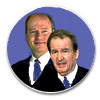|
Third
Party Presidential Candidates
NewsHour Links: The
Buzz: A first-time voter asks: "What's the Deal? NewsHour coverage of Election 2000 Outside
Links: The U.S. Federal Election Commission: Info about financing campaigns for federal office, the rules and regulations pertaining to this process, or elections and voting in general. Don't pass up your opportunity to have your say. If you're eighteen, make sure you're registered to vote. Click here for more information on voter registration.
|
Outside
the Mainstream Seems like you can't open a newspaper or turn on the radio or TV without seeing or hearing Al Gore or George W. Bush these days. And chances are that's the way it will stay until well after the presidential election in November. But if you listen carefully, you might hear some alternative voices in the background. Third party candidates, "shadow convention" delegates and protesters are having their say outside the spotlight. Two's Company. Three's a Crowd.
Now, of course,
it's one of our two main parties. But there are and have been many "third
parties". Anti-Masons, Free-Soilers, Know-Nothings, Prohibitionists,
Populists, Socialists, Communists, States' Righters and Libertarians--
they've all nominated candidates for president in the past.
Technically, there's
nothing to stop a third party from becoming a major party. However, the structure of the U.S. electoral system is stacked against third parties-- we'll get to that later. Why Try? History shows third
parties have had-- and continue to have-- significant effects on the
political system, even when their candidates don't win elections.
"An Avenue to Tyranny" There's no mention of political parties in the constitution. In fact, the founding fathers were highly suspicious of political parties. Alexander Hamilton called them "an avenue to tyranny." But a two-party system quickly formed around the conflicting views of Hamilton, who wanted a strong federal government, and Jefferson, who wanted more power for the states. Other parties came and went, but the Republican and Democratic parties eventually became the two dominant parties. The Libertarian Party, founded in 1971, is the oldest of the five nationally organized third parties.
The U.S. Taxpayers Party was formed in 1990. Last September it changed its name to the Constitution Party. The Natural Law Party was founded in 1992, and the Reform Party in 1995. The Reform Party The
Reform Party can claim dominance in a few recent elections. In the 1996
presidential campaign, Ross Perot spent more money and received more
votes (8.39 percent) than all other third party candidates combined. In
1998 the Reform Party became the first third party since 1914 to receive
more than 1 million votes for all of its governor candidates combined.
(Over half of those votes were for Jesse Ventura.) Look at it this way: Perot's 9 percent share of the popular vote in our last election matched the number of votes by which Bob Dole lost to Bill Clinton.
So Why Don't They Take Off?
There are several institutional reasons a third party would have a difficult time catching up with the Republican or Democratic Party. The party leadership would have to spend a great deal of time and money wading through the paperwork and requirements for nominating candidates and establishing itself. For example, presidential candidates must satisfy 50 different sets of ballot requirements. To win, a presidential candidate would have to do very well in several big states. That's because our "Electoral College" system of tallying up votes cast for presidential candidates is a "winner-take-all system". (Click here for more on this complicated system.) In other words-- whoever gets the most popular votes in a state gets every single state "elector" from that state. If you did well but didn't quite win in a state, you'd get zero "electors". All the popular votes you'd won would be for nothing. And there's far less public funding or media exposure for third parties. Five is the Magic Number But there's nothing to keep a party from trying. And, if any third
party candidate wins 5 percent of the nationwide vote in November, his
or her party will be guaranteed federal funding for its next presidential
campaign. It's a goal worth working towards for parties with a lot to say, but not much money to help them say it. In the Shadow of the Giants Besides third parties, "shadow conventions" are being held this year. The organizers of
"Shadow Conventions 2000" say they'll counter the conventional
by focusing on issues that the major parties just won't touch. The shadow conventions
parallel the Republican and Democratic National Conventions, taking
place at the same time and in the same cities as the Republican National
Convention in Philadelphia and the Democratic National Convention in
Los Angeles. On the concluding
day of each convention, planning sessions on community service are held. Taking it to the Streets
Some of the same protesters who disrupted last year's meeting of the World Trade Organization in Seattle and overshadowed a World Bank and International Monetary Fund meeting in Washington earlier this year, are "attending" both the Republican convention in Philadelphia and the Democrats in Los Angeles. The protesters, a loosely organized coalition of varied interest groups, have a wide agenda which includes opposition to global trade agreements and the power of multinational companies, defense of the environment, promoting women's rights in the industrialized and developing world and promoting workers' rights to unionize.
|







 When
the Republican Party's candidate, Abe Lincoln, won the presidency in
1860, his was a minor party.
When
the Republican Party's candidate, Abe Lincoln, won the presidency in
1860, his was a minor party. America
currently has five nationally organized third parties: Reform, Libertarian,
Green, Constitution (formerly the U.S. Taxpayers), and Natural Law.
Each of these five parties has received 100,000 votes or more for at
least one of its candidates in the past 20 years. (No other currently
existing third party in America has done so.)
America
currently has five nationally organized third parties: Reform, Libertarian,
Green, Constitution (formerly the U.S. Taxpayers), and Natural Law.
Each of these five parties has received 100,000 votes or more for at
least one of its candidates in the past 20 years. (No other currently
existing third party in America has done so.) When
Theodore Roosevelt ran in 1912 as the Bull Moose Party's candidate,
he got 88 electoral votes and took enough votes from William Taft so
that he lost to Woodrow Wilson. George Wallace in 1968, John Anderson
in 1980 and Ross Perot in 1992 and '96 all won a significant share of
the popular vote.
When
Theodore Roosevelt ran in 1912 as the Bull Moose Party's candidate,
he got 88 electoral votes and took enough votes from William Taft so
that he lost to Woodrow Wilson. George Wallace in 1968, John Anderson
in 1980 and Ross Perot in 1992 and '96 all won a significant share of
the popular vote.  In
l984, the first U.S. Green organizing meetings were convened. The first
Green Party candidate appeared on the ballot in 1986.
In
l984, the first U.S. Green organizing meetings were convened. The first
Green Party candidate appeared on the ballot in 1986. The
Reform Party is the only third party to have elected a governor: former
pro wrestler Jesse Ventura of Minnesota. He later became an independent
after fighting with the leaders of the party.
The
Reform Party is the only third party to have elected a governor: former
pro wrestler Jesse Ventura of Minnesota. He later became an independent
after fighting with the leaders of the party.  Each
shadow convention kicks off with a Sunday session laying out themes.
These kick-off sessions are followed by successive days of general sessions
on three linked issue areas the organizers say are ignored by the party
conventions. Here are the three issues in their own words: "the
predominance of money politics and consequent need for campaign finance
reform, growing economic inequality and the persistence of poverty in
the midst of a seeming long boom, and the dangerously failed war on
drugs."
Each
shadow convention kicks off with a Sunday session laying out themes.
These kick-off sessions are followed by successive days of general sessions
on three linked issue areas the organizers say are ignored by the party
conventions. Here are the three issues in their own words: "the
predominance of money politics and consequent need for campaign finance
reform, growing economic inequality and the persistence of poverty in
the midst of a seeming long boom, and the dangerously failed war on
drugs."  And
last but not least, there are the voices of those who aren't necessarily
members of a mainstream or third party or delegates at the shadow conventions.
And
last but not least, there are the voices of those who aren't necessarily
members of a mainstream or third party or delegates at the shadow conventions.